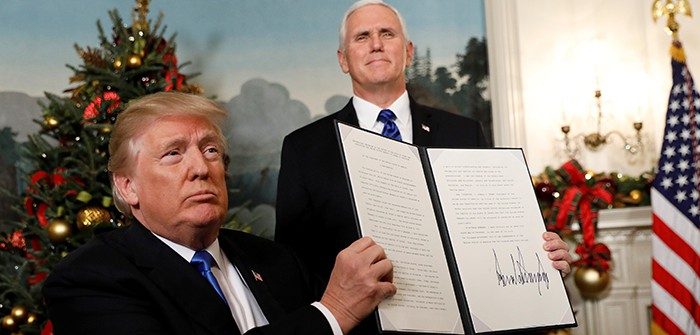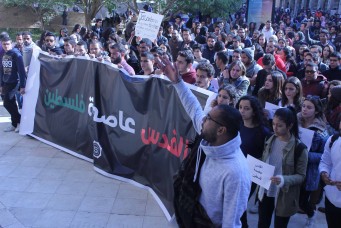Trump’s Jerusalem Decision: Why Now?
What led Trump to go against established U.S. domestic and foreign policies for a move that would gain the United States nothing? That it would cost the United States nothing.

U.S. President Donald Trump holds up the proclamation that the United States recognizes Jerusalem as the capital of Israel and will move its embassy there, during an address from the White House in Washington DC, Dec 6, 2017. Kevin Lamarque/Reuters
In 1995, the United States Congress passed the Jerusalem Embassy Act, recognizing the holy city as the undivided and eternal capital of Israel, and ordering the U.S. embassy to be moved to from Tel Aviv to Jerusalem. Since then, however, no American president—Republican or Democrat—has dared to implement it; Bill Clinton, George W. Bush, Barack Obama, and even Donald Trump on June 1, 2017, have all made use of the congressional bill’s provision for a presidential waiver to suspend its implementation on the basis of U.S. national security concerns.
What has changed? What has emboldened Trump to take a step for which there was no need and which does not enjoy the support of his national security advisors, Secretary of State, or leading congressmen? Why now when even Jewish and Israeli lobbying groups and influential evangelical leaders recognize the fact that no U.S. president would have moved in that direction unless within a comprehensive Middle East Peace deal? The reason is simple: Trump wants to be the president who breaks with precedents and, given the political climate in the Arab World, he knows that Washington would suffer no political cost in its relations with Arab countries as a result of such a move.
Trumps desires to be the U.S. president of firsts: the first to visit Israel at the outset of his tenure (after Saudi Arabia); the first to pray at the Wailing Wall; the first to recognize Jerusalem as the capital of Israel and to move the U.S. embassy to the holy city. This inclination, coupled with his background as an outsider to the traditional political system, have made it easier for him to disregard U.S. domestic and foreign policies in order to proceed with his agenda.
The decision to move the embassy to Jerusalem comes as no surprise when considering Trump’s choice of advisors on the Arab-Israeli conflict. The three main players overseeing this dossier are known to be financial donors to expansion projects in illegal settlements in the occupied West Bank. The current U.S. ambassador to Israel, David Friedman, a conservative Jewish lawyer from New York, has emphasized his intent to strengthen cooperation between the United States and Israel more than ever before. Jason Greenblatt, the U.S. special representative for international negotiations, an Orthodox Jewish lawyer, reiterated that Trump would move the embassy to Jerusalem, confirming that, unlike traditional politicians, he would keep his campaign promise. Trump’s most important advisor and son-in-law Jared Kushner is another Orthodox Jew, who met with many Arab rulers including Saudi Crown Prince Mohamed Bin Salman and the Crown Prince of Abu Dhabi Mohammed Bin Zayed and managed to sell them the president’s vision to solve the conflict at the expense of the Palestinians.
Suggestions that Trump’s declaration is an attempt to extricate himself from the Russian investigation by cajoling Israeli lobbyists carry little weight. Since the inquiry is an independent one, uninfluenced by lobbying or pressure groups, this would not work. Rather, Trump is merely delivering on his campaign promise to move the embassy, after having delayed it last June to give a peace deal between Israelis and Palestinians a chance, as he claimed.
Perhaps what emboldened Trump even further were recent developments in the Arab world which set the scene for the passing of such a declaration without any consequences. Preoccupied with their own domestic and regional problems, Arabs’—rulers’ and peoples’—support for the Palestinian cause, including the status of Jerusalem, has waned.
In addition to the repercussions of the Arab Spring and the expansion of terrorist groups, the Arab World today faces the threat of Iran’s meddling hand in the region which it perceives as the first and foremost threat in the region. This has led Arab ruling elites to go as far as considering Israel an ally that would take their side in confronting Iran’s growing influence. Additionally, Saudi rulers are willing to adopt any policies that Washington, and its ally Israel, see fit, to avoid dealing with the threat of the Justice Against Sponsors of Terrorism Act (JASTA). And Saudi internal politics have allowed Riyadh to pressure the Palestinians into accepting whatever was offered them by Washington and Israel as well. Meanwhile, the Palestinians were alarmed with the threat of closing the Palestine Liberation Organization (PLO) office in Washington, and the Egyptian government has been coaxed with what it considers to be a unique and strong friendship with President Trump. Also, the fact that Arab countries are now rushing to normalize relations with Israel, both secretly and publicly has led Trump to trust that Arab rulers would accept U.S. recognition of Jerusalem as Israel’s capital, which, as far as Trump believes, is merely the recognition of a historical fact as well as the status quo.
A year ago I argued that Arab states, the Arab League and the Organization of Islamic Cooperation should brace themselves for untraditional scenarios from the Trump administration. I suggested that a dramatic decision from the new President to move the U.S. embassy from Tel Aviv to Jerusalem would not be farfetched. Indeed, recent developments in Israel, the United States, and Arab countries have created a new reality that made it easier for Trump to take a decision that none of his predecessors dared to.
Translated from the Arabic by Asmaa Abdallah.
Mohamed Elmenshawy is the Washington-based foreign affairs columnist for Al-Shorouk, an Egyptian Daily. On Twitter: @ElMenshawyM.
Subscribe to Our Newsletter



